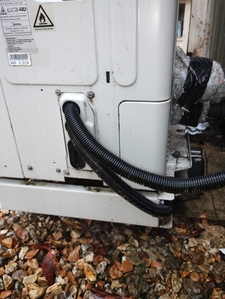Midea ASHP – how to set weather compensation
@cathoderay the dataloggers have been purchased and are on their way. The plan as per your instructions, is to leave one outside for OAT and one inside for the IAT. My wired controller is in a cupboard with the buffer tank and primary pipework but I've just put a thermostat in there with the door open to see if the temperature is in line with other parts of the house. If it is then I guess I can put the second datalogger there to measure IAT. The only thing that doesn't help with is the coldest rooms in the house which are at the other end of the house so I guess for now, I will have to just check the thermostat at that end during the experiment.
On a different note, I had the chance to talk to an ASHP engineer today as he was here to check my recent PV installation. I showed him my set-up and he suggested that my winter problem could be that the buffer tank could be receiving hot water from the ASHP at say 20 litres per minute and the flow rate out and back in to the buffer tank could be say 25 litres or more meaning that 5 litres of water that's cooled through the UFH and rads system is mixing with the ASHP water thus cooling it down and forcing the ASHP to work harder.
He suggested that once I've run the winter tests and if I have a problem, they could bypass the buffer tank and use it as a system volumiser with 2 separate zones for the UFH and the radiators. We then use the pump within the ASHP which is much bigger than any internal water pumps we might have. Sounds interesting and I think he knows what he's talking about. He was going to check with Freedom whether Midea controllers can do 2 zones - @cathoderay you may already know the answer to that question. At least that sounds like a better solution than to wire the buffer tank immersion into the system and give me a massive kettle to overcome the problem at high cost.
Another issue (you guys have started me off on a path of obsession) is that during the summer, the heating part of the ASHP is dormant. Not an issue I assume. In the winter, the ASHP will start up using WC and I will use that to control IAT with an open system. Here I am assuming that I just set the room thermostats to a high temperature to keep the system running at whatever flow temp the ASHP decides is right. Now what happens if (as is probable in a house that is long, thin and not compact) if some rooms reach the temperature I want and others are too hot? How do I tweak parts of the house where let's say the IAT is 3C more than I want?
Finally (for now) I have been reading the posts on setback. I took from those that setback probably isn't compelling given the extra work required to bring the house back to desired temperature (although I'm confused about how you do that when running WC anyway). We are often away for anything up to 2 months in the winter, a different kind of setback. It would make sense to set a different WC curve so that the ASHP flow temp is lower when we are away and the IAT is let's say 5 degrees lower than normal. But how do I get the house back to desired, normal IAT for when we get back? Can you program WC differently for different periods? I imagine not. In those scenarios, what I do is use the room thermostats that can be programmed to desired "away" IAT and to come back on say 1 week before returning at normal IAT. I know my energy use is way lower when I do that as I have daily KWh stats for the last 18 months and I can compare winter away and home months when the KWh usage is about 20-30KWh lower for away periods (adjusted for the fact that I am using no DHW, washing machine, oven etc). Is this the best solution or is there something else that would be optimal?
Many thanks
Posted by: @pash44pump@cathoderay the dataloggers have been purchased and are on their way. The plan as per your instructions, is to leave one outside for OAT and one inside for the IAT. My wired controller is in a cupboard with the buffer tank and primary pipework but I've just put a thermostat in there with the door open to see if the temperature is in line with other parts of the house. If it is then I guess I can put the second datalogger there to measure IAT. The only thing that doesn't help with is the coldest rooms in the house which are at the other end of the house so I guess for now, I will have to just check the thermostat at that end during the experiment.
Yes, one outside in a sheltered place (mine was in a coal bunker of all places!), the indoor one I would initially put somewhere where the IAT matters, eg a much used room. You can also pit it in different rooms at different times to check for over/under temperatures.
Posted by: @pash44pumpHe suggested that once I've run the winter tests and if I have a problem, they could bypass the buffer tank and use it as a system volumiser with 2 separate zones for the UFH and the radiators. We then use the pump within the ASHP which is much bigger than any internal water pumps we might have. Sounds interesting and I think he knows what he's talking about. He was going to check with Freedom whether Midea controllers can do 2 zones - @cathoderay you may already know the answer to that question. At least that sounds like a better solution than to wire the buffer tank immersion into the system and give me a massive kettle to overcome the problem at high cost.
I don't know the answer to that question, but the wired controller does I think have zones, though I only use one. Let's see what answer Freedom come up with (they don't like talking to us mere end users, but will talk to installers/engineers). The buffer tank is almost certainly a problem, converting it to a volumiser and not putting in a kettle element is certainly worth thinking about.
Posted by: @pash44pumpAnother issue (you guys have started me off on a path of obsession) is that during the summer, the heating part of the ASHP is dormant. Not an issue I assume. In the winter, the ASHP will start up using WC and I will use that to control IAT with an open system. Here I am assuming that I just set the room thermostats to a high temperature to keep the system running at whatever flow temp the ASHP decides is right. Now what happens if (as is probable in a house that is long, thin and not compact) if some rooms reach the temperature I want and others are too hot? How do I tweak parts of the house where let's say the IAT is 3C more than I want?
I think I have already warned you about HDHD (Heat pump Deficit Hyperactivity Disorder), a neurotic condition with an insidious onset that left unchecked can get seriously out of hand. The only known cure is a long vacation on a tropical island. More seriously, yes, room stats set high, then tweak the WCC via the wired controller For Serviceman menu to get the IAT about right. If there are big between room differences, use the lock shield valves to balance the rads, but don't overdo it, as I did, and end up throttling the system. If the UFH areas are too warm, I presume (as I don't have UFH myself) the UFH has something that does the same this as a lock shield valve. Others with UFH may be able to give more detailed advice.
Posted by: @pash44pumpFinally (for now) I have been reading the posts on setback. I took from those that setback probably isn't compelling given the extra work required to bring the house back to desired temperature (although I'm confused about how you do that when running WC anyway).
I think it is fair to say the jury is still out on short (overnight) setbacks. You implement them by lowering the main room stat set temperature, the WCC stays the same, but the room stat in effect turns off the heat pump during the set back period. Difficult to heat houses like mine and I think yours can be very slow to reheat after a setback, which is one of the reasons I have my auto-adapt script, which raises the WCC is the IAT is lower than it should be. Longer setbacks (days/weeks/months) clearly do save money, and can be achieved solely by using the room stat (say set to 10 degrees) or, possibly by the wired controller which I think has something called Holiday mode (or some such name), which sounds like it is meant for just such a scenario.
Hope that helps!
Midea 14kW (for now...) ASHP heating both building and DHW
@cathoderay thanks very much. I seem to be making progress both in my understanding and finding potential future solutions. At the very least the engineer who came this morning reckons that the buffer tank issue would be under a day's plumbing work to resolve provided the Midea controller can do 2 zones, so I may have a decent fallback position if the original installer doesn't resolve everything satisfactorily.
He also mentioned that underheating of the property could also be partly due to the shape of the house, very long and thin with big pipe runs and that when it was built with an oil-fired heating system, the gaps between the UFH pipes could have been set at 150mm or even 200mm whereas (as I am sure you know) 100mm is optimal for UFH due to the lower flow temperatures. I guess only a thermal camera would show us that.
Interestingly, he also reckons that the ASHP outlet pipes should have been on 90 degree fittings to allow them to be insulated properly (as the ASHP is too close to the wall to allow a decent bend and get proper 19mm insulation on them - see photo below.
Thanks again to all those who contribute so much knowledge here.
Posted by: @pash44pumpOn a different note, I had the chance to talk to an ASHP engineer today as he was here to check my recent PV installation. I showed him my set-up and he suggested that my winter problem could be that the buffer tank could be receiving hot water from the ASHP at say 20 litres per minute and the flow rate out and back in to the buffer tank could be say 25 litres or more meaning that 5 litres of water that's cooled through the UFH and rads system is mixing with the ASHP water thus cooling it down and forcing the ASHP to work harder.
He suggested that once I've run the winter tests and if I have a problem, they could bypass the buffer tank and use it as a system volumiser
Agree entirely, in fact I think I made this comment and suggestion to remove the buffer tank earlier in the thread.
Not so sure about the '2 zone' part of his idea though, needs a bit of thought. Like a boiler the ASHP can only ever supply one flow temperature at any one time so while the controller may feature 2 zones (as mine does) I'm not sure exactly what practical use it is. Given that you dont really need the upstairs heated I might be tempted to try running on a single zone at UFH temperature. This will provide background heat upstairs (much better than turning off the rads altogether) without any of the complexities of mixing etc. It could well be the best approach for your particular case.
Posted by: @pash44pump. In the winter, the ASHP will start up using WC and I will use that to control IAT with an open system. Here I am assuming that I just set the room thermostats to a high temperature to keep the system running at whatever flow temp the ASHP decides is right. Now what happens if (as is probable in a house that is long, thin and not compact) if some rooms reach the temperature I want and others are too hot? How do I tweak parts of the house where let's say the IAT is 3C more than I want?
To turn down rooms that are too hot reduce the rate of flow (and thus average flow temperature) through the relevant loops/radiators. On radiators you do this using the lockshield valves. On UFH there should be a flow adjustment of some kind on each loop.
Posted by: @pash44pumpIt would make sense to set a different WC curve so that the ASHP flow temp is lower when we are away and the IAT is let's say 5 degrees lower than normal. But how do I get the house back to desired, normal IAT for when we get back? Can you program WC differently for different periods? I imagine not.
You can, in effect, do the latter with a Vaillant and some others (which is one reason I like the Vaillant interface), but not I think with Midea.
As @cathoderay says 'holiday mode' is the ideal tool, set it to switch on when you leave and exit from holiday mode well before you return. If it doesnt feature holiday mode your only options are
- set thermostats low
- turn heating off and rely on the frost prevention function to turn it on when its very cold to stop it freezing
The problem with either of these is if, you are relying on switching it back manually, you will have a cold house for a day or two after you return.
Hope that helps
4kW peak of solar PV since 2011; EV and a 1930s house which has been partially renovated to improve its efficiency. 7kW Vaillant heat pump.
Posted by: @pash44pumpe gaps between the UFH pipes could have been set at 150mm or even 200mm whereas (as I am sure you know) 100mm is optimal for UFH due to the lower flow temperatures. I guess only a thermal camera would show us that.
Yes. They cost about £400 to buy or you might be able to get one on loam (as it happens I run a free thermal camera loan scheme through our local library, but thats of no use to you unless you are in East Herts/West Essex.
If they are at this spacing then you will need a higher flow temperature than is normal for UFH, which is one of the reasons I asked upthread if you happen to know what flow temp the UFH mixer was set to when it was successfully working on oil.
4kW peak of solar PV since 2011; EV and a 1930s house which has been partially renovated to improve its efficiency. 7kW Vaillant heat pump.
The midea has a number of pre programmed WC curves (with one being eco) and then 9 is the customisable curve.
You could 'set back' the WC curve by selecting the eco option (this is a simple 'switch' it would appear rather than having to go into the WC curve settings and selecting that option) albeit whether this is in fact any more eco when selecting this curve will obviously depend on what your standard curve values are set at i.e. they might indeed be lower as default. Sounds potentially unlikely in your case.
Likewise if you are trying to get the house back up to temp you could tweak the values higher.
As already mentioned there are a few options to remotely control and monitor this without going to the control panel every time, and indeed ways to automate changes to WC curve settings if you wanted. Planet atmo and svenar are the only ones I'm aware of. Homely similar but much less is controllable by the end user via the app. Or DIY route. I also use a load of tapo temp sensors around the house which measure temperatures at various spots and the graphs are all easily accessible and viewable in an app. I also use these to control TRVs which have been sparingly deployed on a few radiators in the house.
Posted by: @pash44pumpI guess only a thermal camera would show us that.
I managed to find a perfectly good new but 'last years model' standalone one for £227 on Amazon in April 2024, and am miffed to see it is now only £179! I got it to find cool spots in the house that would benefit from better insulation or whatever, and that it might pay for itself that way, but it has also turned out to have other very useful uses eg newly installed engine running temps on the boat (all OK, and now have a benchmark), is the newly packed inboard shaft bearing getting too hot from being too tight (it wasn't) etc etc. It can take snapshots which you can then download to a PC and look at at leisure and of course keep for future reference. All in all a very useful bit of kit. Given the characteristics of your house, I suggest it might be worth getting one.
Edit I was sure I payed less than £200, and in fact looking in more detail at my records, I got an Amazon 'promotional code' and ended up paying £192.79. But the current £179 still beats that, so I am still a bit miffed!
Midea 14kW (for now...) ASHP heating both building and DHW
Currently viewing this topic 1 user ( cathodeRay ) and 1 guest.
Recently viewed by users: pash44pump 42 minutes ago, JamesPa 8 minutes ago.
- 26 Forums
- 2,158 Topics
- 47.4 K Posts
- 32 Online
- 5,736 Members
Join Us!
Podcast Picks
Latest Posts
-

RE: COP is not the only measure of efficiency
@jamespetts Interesting post, thanks. Here are my thou...
By GrahamF , 15 seconds ago
-
RE: Who’s Caved and Switched the Heating On Already?
@editor So… who’s given in and turned the heating on al...
By Lucia , 31 minutes ago
-
RE: Havenwise App Help & Forum Support – Get the Most from Your Heat Pump
I am pleased to say at 4pm today we have added another ...
By ASHP-BOBBA , 1 hour ago
-
RE: Heat Pump Servicing & Maintenance – Good Value or Rip-Off?
@jamespa Thanks. Yes, its a bit sad so many of these jo...
By ASHP-BOBBA , 1 hour ago
-

RE: Midea ASHP – how to set weather compensation
I managed to find a perfectly good new but 'last years ...
By cathodeRay , 1 hour ago
-

RE: Buffers, hot water and cooling
@jamespa Your reasonably close! Especially with warmer ...
By dgclimatecontrol , 3 hours ago
-
RE: Renewables & Heat Pumps in the News
To unpack this a little.... 1) how many of us in this...
By Lucia , 10 hours ago
-
RE: Vaillant aroTherm Plus 10kW thoughts?
@realevil the fans and fan speed / coil size (height, w...
By ASHP-BOBBA , 21 hours ago
-
RE: Mitsubishi Ecodan 11kw Defrosting Issue.
@morgan this can just be done by your sepecilist when t...
By ASHP-BOBBA , 21 hours ago
-
RE: Anyone still weathering it out with Agile?
@toodles I guess it all comes down to import averages. ...
By Tim441 , 1 day ago
-

RE: 300 Liter Tank - Do I have to heat it all?
The size of DHW tank affects the anti-legionella cycle....
By Transparent , 1 day ago
-
RE: Heat Pump SCOPs – The Truth Might Not Be What You Think
@scalextrix Name plate capacity
By HCas , 1 day ago
-
RE: Solar Thermal DHW and ASHP
I was originally contemplating a solar thermal installa...
By jamespetts , 1 day ago
-
RE: Solar Power Output – Let’s Compare Generation Figures
My system installed in July 2024 has produced 6.4mWh in...
By jamespetts , 1 day ago
-

RE: A Customer's Lessons Learnt from a Heat Pump Installation in a Large House
@judith thanks for your suggestions. Starting from col...
By GrahamF , 2 days ago
-
RE: Inventor (Midea) Heat Pump short cycling advice
I switched to "fan coil mode" to be able to set water t...
By immunity , 2 days ago
-
RE: DESNZ doing a survey which asks the right questions!
Without a survey their only source of data is probably ...
By JamesPa , 2 days ago
-
RE: Can you help with our research: solar panels, EV chargers, home batteries, heat pumps?
Just done your survey!
By Judith , 3 days ago
-
RE: Failing heat pump system - seeking thoughts on a rebuild
@cleardene-ashp just thinking about your issues here. Y...
By Judith , 3 days ago





